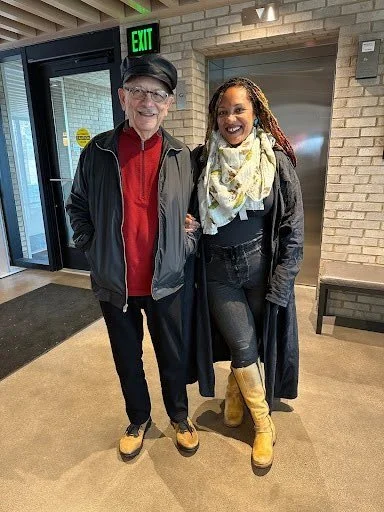November Newsletter: Tools for Processing War and Genocide at Work
A WORD FROM IRIS
I have been wanting to reach out to you all for a while. I've been tending to my own family and community, including visiting my grandfather to celebrate our Scorpio joint-birthdays. And I've been grappling with what to say.
My grandfather is an incredible man. He is an architect, a poet, an art lover, an entrepreneur, a wonderful father, grandfather and great grandfather. My grandfather is also a survivor of the Holocaust. His experiences of persecution because of his Jewish identity have not swayed his or our family’s collective belief that no humans should ever experience genocide. There is no such thing as honoring our ancestors if it means killing children, families, and committing genocide.
I imagine that many of you are struggling with how to show up for yourselves and each other in light of recent global developments. I’ve been taking notes, seeing what’s been said throughout the media, and I’ve compiled a list of important considerations and tools to help structure meaningful dialogue. And as always, reach out if you want to connect more.
Things to remember as an individual
Your work colleagues are not necessarily your friends, your family, or even your comrades. If you aren’t able to find solace or support in work spaces remember that it’s work – nothing more and nothing less. And that’s okay.
Our workplaces and colleagues are not inherently therapeutic and often don’t have the resources to support these types of difficult conversations. Please utilize professional therapeutic support – not your supervisor – to work through your anxiety about war and genocide.
Be kind to each other and recognize that folks are struggling in different ways. These include those who are taking in the news daily, those that are personally connected and those that are too overwhelmed to engage. Lead with compassion and work for justice.
Continue to educate yourself. Continually return to these three questions:
What social identities (race, gender, class, etc.) do I have that are similar to or different from the people being impacted? How can I use my privilege? How can I pull from my experiences or knowledge of oppression to advocate for justice?
Check out this framing from Deepa Iyer and find out what your personal and organizational role is in change work.
Principled struggle teaches us that our liberation is tied up in each other’s. Let’s take this time to tune in and not away, however that looks for you.
Things to remember as an organization
You and your staff are witnessing a genocide in Palestine that is being filmed for daily consumption. It is imperative that you acknowledge the impact this might be having on your staff.
You and your staff are complex beings who can unite around alleviating human suffering. We can all acknowledge the complexity of the history between Israel and Palestine while demanding an immediate ceasefire.
The goal of taking a public stance or putting out a message is for it to be in service of your organizational work and mission. This is not the time to be performative.
Any internal statement needs to be centered on your staff's identities and their needs. Any statement – external, internal, or sensitive – needs to include actions and an acknowledgement that all human lives are valuable.
Providing processing spaces doesn’t necessarily mean they need to be open for all staff. Try to have spaces for BIPOC staff, white staff, Muslim staff, Jewish staff, Queer staff, etc., to have more intimate, private, and accountable conversations.
If you do decide to have a conversation, make sure it is well-facilitated and includes clear goals, outcomes, and objectives.
Look into related events/programming/literature for folks to engage with as an organization, and then discuss whatever you took in, together.
Remember to collaborate with other organizations. Spaces can be created for full staffs and organizations, particularly in coalition with each other, to process, support, and be in community.
Remember that this is not the only world conflict occurring and that it is possible to be plugged into all of these injustices. Some of your staff may be.
Also, it is important to remember the particular impacts of war and genocide on People of the Global Majority. It is very easy to see the parallels between the treatment of Palestinians and the way many of our families currently or historically have been treated in the United States and by other powerful Western nations. Those parallels also mean that we can lean on each other and find support in this moment.
At the same time, let’s constantly challenge the internalized oppression that shows up in our relationship with the United States and its imperialism. White folks, this is your time to show up to utilize your privilege and demand justice with all of your might.
Here are some additional resources & actions
Call on Congress to demand they stop fueling violence. The tool below will connect you to your representatives in the House and Senate. Call at jvpaction.org/noweaponsig

